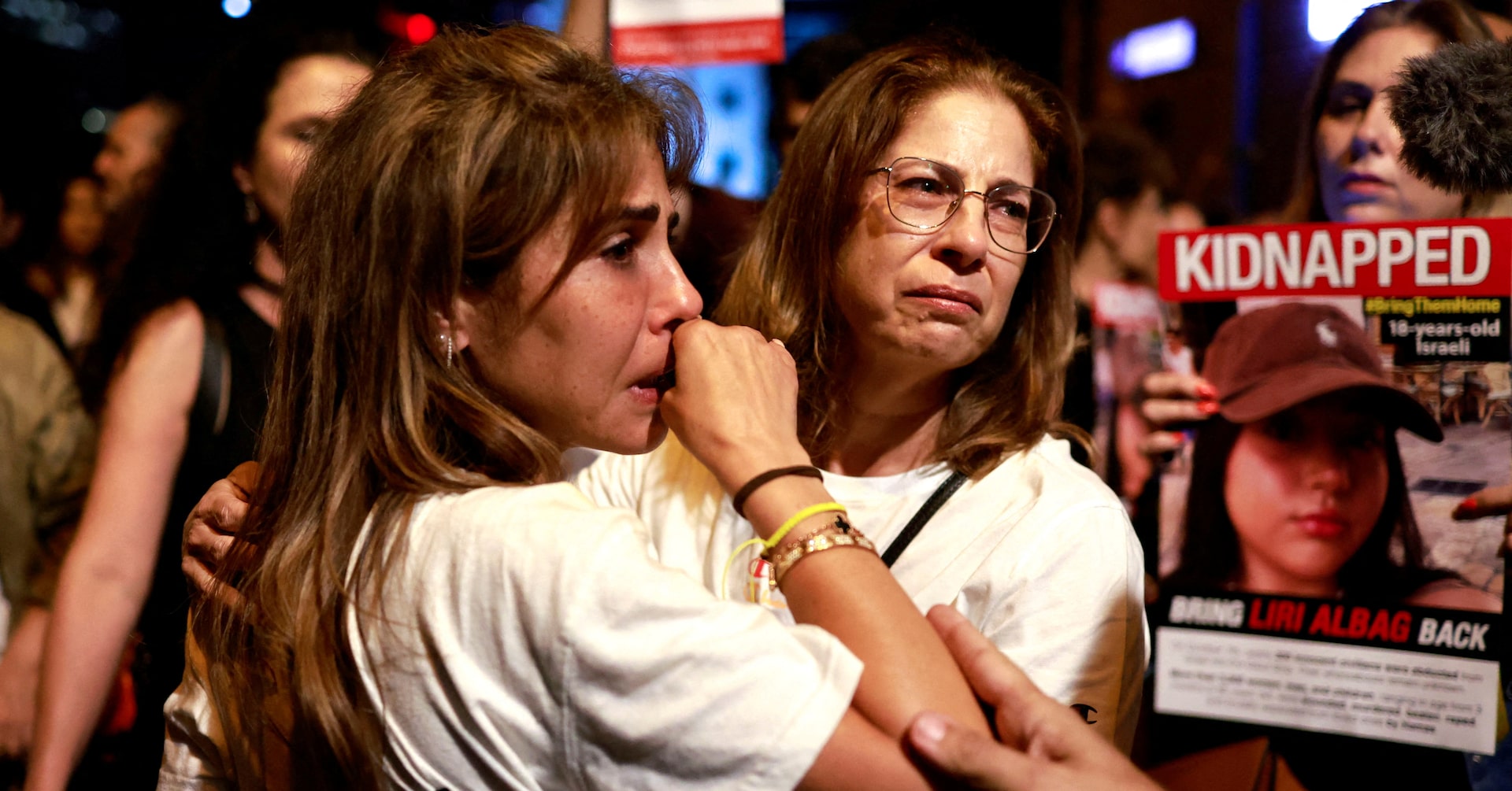The Nightmare In Gaza: Hostage Families' Enduring Ordeal

Table of Contents
The Psychological Toll on Hostage Families in Gaza
The psychological impact of the Gaza Hostage Crisis on families is devastating and far-reaching. The prolonged uncertainty surrounding the whereabouts and well-being of their loved ones creates immense psychological strain. Days turn into weeks, weeks into months, filled with agonizing fear, anxiety, and the gnawing weight of the unknown. This constant state of distress manifests in various ways:
- Sleeplessness and Nightmares: The inability to sleep peacefully, plagued by nightmares reflecting their fears, is a common experience. The trauma of separation deeply impacts the quality of life for these families, creating a cycle of exhaustion and emotional vulnerability.
- Loss of Appetite and Physical Health Problems: The intense emotional stress often translates into physical manifestations, including loss of appetite, weight loss, and a range of health complications stemming from chronic anxiety and lack of proper rest.
- Mental Health Challenges: Many family members struggle with Post-Traumatic Stress Disorder (PTSD), depression, and debilitating anxiety disorders. The constant fear for their loved ones' safety triggers a cascade of mental health challenges that require professional intervention.
- Strained Family Relationships: The immense pressure and prolonged stress often put a significant strain on family relationships. Conflict and misunderstandings arise as family members cope with the crisis in their own ways, leading to further emotional distress.
The lack of readily available mental health support services in Gaza exacerbates the situation, leaving many families to cope with their trauma without adequate professional help. The need for dedicated mental health support programs specifically designed to address the unique challenges faced by families affected by the Gaza Hostage Crisis is paramount.
The Humanitarian Challenges Faced by Hostage Families
Beyond the psychological toll, the Gaza Hostage Crisis presents a myriad of severe humanitarian challenges for affected families. The already fragile socio-economic conditions in Gaza are further destabilized by the crisis, pushing families into deeper poverty and vulnerability.
- Difficulty Accessing Basic Necessities: The families often struggle to afford basic necessities like food, water, and essential medical care. The lack of financial resources and the disruption caused by the crisis hinder their ability to meet their basic needs.
- Loss of Livelihoods: Many family members are the primary breadwinners, and their abduction leads to the loss of income and a complete disruption of the family's financial stability. The economic hardship this creates further compounds their suffering.
- Challenges in Obtaining Legal Assistance or Information: Navigating the legal complexities and obtaining reliable information about the hostages' situation often proves incredibly challenging. The lack of access to legal aid and transparent communication only exacerbates the families' frustrations and anxieties.
- Increased Vulnerability to Exploitation and Abuse: In the midst of this crisis, families become more vulnerable to exploitation and abuse due to their financial hardships and emotional distress. This highlights the need for increased protection and support systems for these vulnerable populations.
Humanitarian organizations play a crucial role in providing vital assistance to these families. However, their resources are often stretched thin, underlining the urgent need for increased international support and collaboration.
International Efforts and Calls for the Release of Hostages in Gaza
The international community has a critical role to play in addressing the Gaza Hostage Crisis. Several international organizations and governments have engaged in diplomatic efforts to secure the release of the hostages. However, the effectiveness of these efforts has been mixed.
- Specific Actions Taken by International Bodies: The United Nations and other international bodies have issued statements condemning the hostage-taking and calling for the immediate and unconditional release of all hostages. They have also provided humanitarian assistance to affected families.
- Statements Released by Governments: Various governments have made public statements expressing their concern and offering support in the pursuit of a peaceful resolution. These statements aim to put diplomatic pressure on relevant parties.
- Effectiveness (or lack thereof) of International Pressure: While international pressure has been exerted, the progress towards a resolution remains slow. The complex political dynamics and the security situation in Gaza continue to impede efforts to secure the release of the hostages.
- Potential Diplomatic Solutions Being Explored: Various diplomatic channels are being explored, including direct negotiations, mediation efforts by third-party countries, and the exploration of potential prisoner exchanges.
The Role of Media in Covering the Gaza Hostage Crisis
The media's portrayal of the Gaza Hostage Crisis significantly impacts public perception and can influence the outcome of diplomatic efforts.
- Accuracy and Fairness in Reporting: Accurate and unbiased reporting is essential to ensure that the voices of the affected families are heard and their plight is properly understood. Sensationalism or misrepresentation of facts only harms the families and hinders the peace process.
- Focus on the Human Stories versus Political Narratives: The media should prioritize the human element of the crisis, giving voice to the families and sharing their stories of resilience and suffering. This human-centric approach can generate empathy and public support for the cause.
- The Potential for Misinformation or Biased Reporting: The risk of misinformation and biased reporting remains a concern. It's crucial for news outlets to verify information carefully and avoid perpetuating harmful stereotypes or narratives.
- The Role of Social Media in Amplifying Voices: Social media has emerged as a significant platform for amplifying the voices of the families and raising awareness about the crisis. This can empower them to share their experiences and demand action.
Conclusion: Understanding the Enduring Ordeal of the Gaza Hostage Crisis
The Gaza Hostage Crisis represents a profound humanitarian tragedy with far-reaching psychological, economic, and political consequences. The families of the hostages endure unimaginable suffering, facing immense psychological strain, humanitarian challenges, and the frustratingly slow pace of international efforts to secure their loved ones' release. It is imperative that the international community remains committed to finding a resolution.
Stay informed about the Gaza Hostage Crisis. Support organizations aiding families affected by the Gaza Hostage Crisis. Advocate for the swift resolution of the Gaza Hostage Crisis. Only through sustained international pressure and compassionate action can we hope to alleviate the suffering of these families and bring a swift and peaceful end to this enduring ordeal.

Featured Posts
-
 Murderbots Existential Crisis A Hilarious Look At Sci Fis Dark Side
May 13, 2025
Murderbots Existential Crisis A Hilarious Look At Sci Fis Dark Side
May 13, 2025 -
 Extreme Heat Warning Paso Robles Under Heat Advisory
May 13, 2025
Extreme Heat Warning Paso Robles Under Heat Advisory
May 13, 2025 -
 Tidak Ada Penempatan Pekerja Migran Di Kamboja Dan Myanmar Pernyataan Resmi Karding
May 13, 2025
Tidak Ada Penempatan Pekerja Migran Di Kamboja Dan Myanmar Pernyataan Resmi Karding
May 13, 2025 -
 Current Obituaries A List Of Recent Deaths In The Community
May 13, 2025
Current Obituaries A List Of Recent Deaths In The Community
May 13, 2025 -
 Fans Rejoice Heist Film Sequel Arrives On Amazon Prime This Month
May 13, 2025
Fans Rejoice Heist Film Sequel Arrives On Amazon Prime This Month
May 13, 2025
